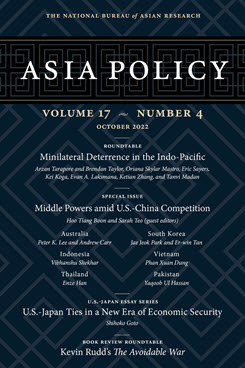Essay in Asia Policy 17.4
“No One Can Force Vietnam to Choose Sides"
Vietnam as a Self-Reliant Middle Power
This essay examines how Vietnam is adapting to U.S.-China rivalry and argues that Vietnam’s room for strategic maneuverability is diminishing as it faces growing internal and external pressure for policy adjustments.
EXECUTIVE SUMMARY
MAIN ARGUMENT
In the past few years, Vietnam has been increasingly labeled as a middle power. Vietnam’s emerging middle-power status coincides with a shifting strategic environment marked by China’s expansionism that has nudged Vietnam toward closer U.S. relations. However, Vietnam’s persistent foreign policy of self-reliance and independence, informed by the country’s historical experiences and concerns over regime security, ensures that Hanoi stays nonaligned. Thus, while retaining autonomy in developing closer U.S. ties, Vietnam strikes a delicate balance between the two superpowers. Instead of relying on a single security guarantor, Vietnam has actively sought to promote rules-based principles and multilateralism in advancing its national interests, particularly vis-à-vis the South China Sea and the Mekong River. However, external and internal developments have strained Vietnam’s ability to balance between the two superpowers.
POLICY IMPLICATIONS
- While increasingly wary of China’s behavior, Vietnam is unlikely to enter a formal alliance with the U.S. due to its firmly held values of self-reliance and independence.
- Vietnam will continue to leverage multidirectional diplomacy to shape regional security and economic architectures in an effort to counterbalance China’s influence and reduce Vietnamese dependence on China.
- Vietnam should exercise more flexibility and show greater resolve in protecting its national interests. To this end, without abandoning its foreign policy of self-reliance and independence, Vietnam should explore new options to advance security cooperation with other major and middle powers with which it shares strategic interests.
Phan Xuan Dung is a Research Officer at the Vietnam Studies Program at the ISEAS–Yusof Ishak Institute (Singapore).
About Asia Policy
Asia Policy is a peer-reviewed scholarly journal presenting policy-relevant academic research on the Asia-Pacific that draws clear and concise conclusions useful to today’s policymakers. Asia Policy is published quarterly in January, April, July, and October and accepts submissions on a rolling basis. Learn more


